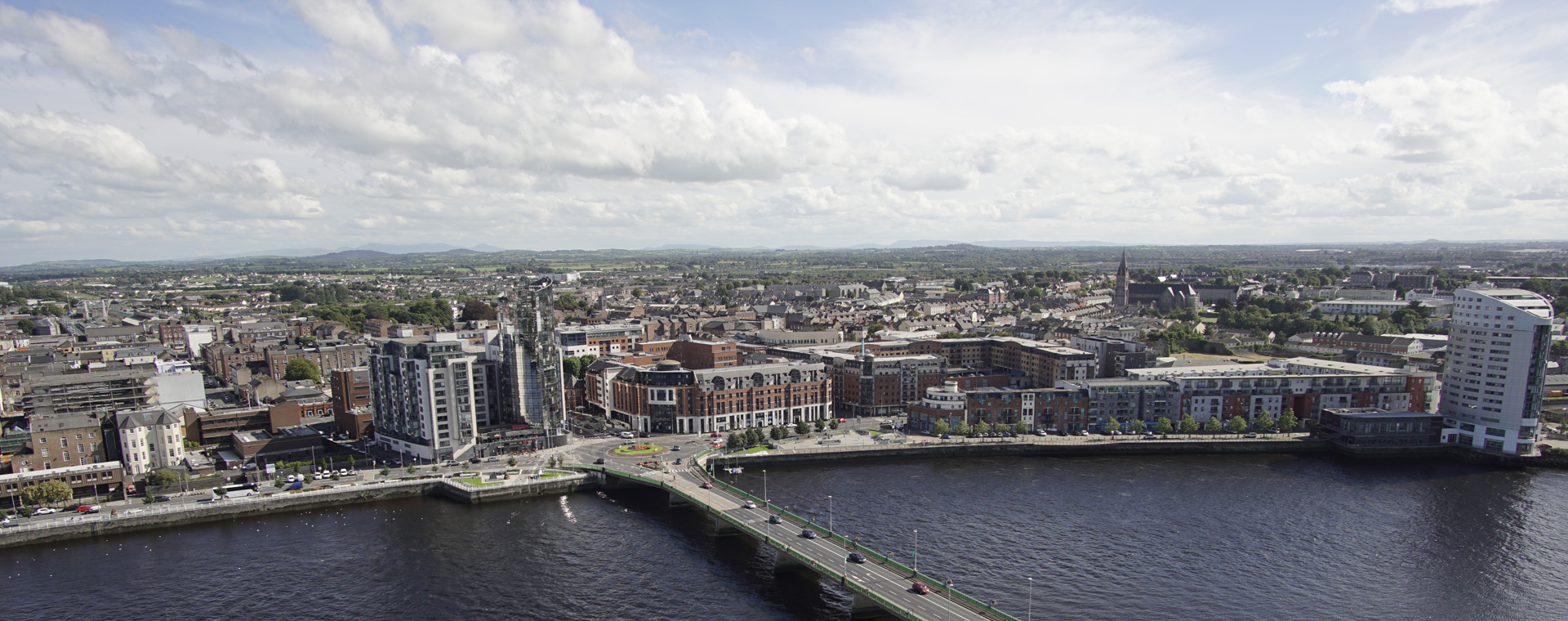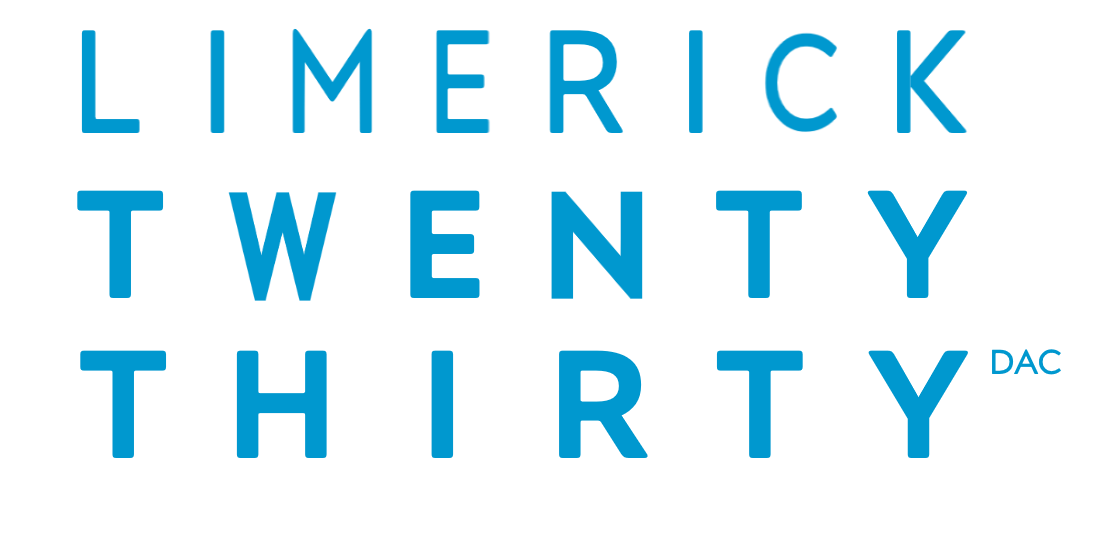While Limerick is a long established and proven location for international business, it is also Ireland’s most future focused city, committed to innovation and economic growth.
Limerick – a city region on the rise
While Limerick is a long established and proven location for international business, it is also Ireland’s most future focused city, committed to innovation and economic growth.

It’s coming together
Limerick’s current economic resurgence has not happened by chance. Like any success, it’s been based on smart planning, hard work and collaboration. The framework for this resurgence has been the Local Authority’s ‘Limerick 2030 – an Economic and Spatial Plan for Limerick’. Limerick Twenty Thirty DAC is one of the key outputs from that plan. The plan set ambitious targets for over €1 billion in enterprise and investment infrastructure to transform Limerick through the economic, social and physical renaissance of Limerick City Centre and the wider Mid West Region. Encouragingly, it is already way ahead of targets in a number of key areas, particularly employment.
The renaissance can be credited to a confluence of events beyond that, including:
- The amalgamation of the City and County councils to create coherent and streamlined local government being the most notable
- The resurgence of Shannon Airport, with 25% passenger growth since 2013 and direct services to the UK, Europe and North America
- Ireland’s largest bulk port company, Shannon Foynes Port Company, which operates ports in Limerick City and down river at Foynes, has tonnage levels approaching record levels and its own enlightened strategy, Vision 2041
- Major investment and growth at the city’s third level entities, University of Limerick (UL), Technological University of the Shannon-Midlands and Mid-West. and Mary Immaculate College
With all these engines of growth making significant advancements and, more importantly, working in collaboration, it’s a region on the rise.
It’s coming together
Limerick’s current economic resurgence has not happened by chance. Like any success, it’s been based on smart planning, hard work and collaboration. The framework for this resurgence has been the Local Authority’s ‘Limerick 2030 – an Economic and Spatial Plan for Limerick’. Limerick Twenty Thirty DAC is one of the key outputs from that plan. The plan set ambitious targets for over €1 billion in enterprise and investment infrastructure to transform Limerick through the economic, social and physical renaissance of Limerick City Centre and the wider Mid West Region. Encouragingly, it is already way ahead of targets in a number of key areas, particularly employment.
The renaissance can be credited to a confluence of events beyond that, including:
- The amalgamation of the City and County councils to create coherent and streamlined local government being the most notable
- The resurgence of Shannon Airport, with 25% passenger growth since 2013 and direct services to the UK, Europe and North America
- Ireland’s largest bulk port company, Shannon Foynes Port Company, which operates ports in Limerick City and down river at Foynes, has tonnage levels approaching record levels and its own enlightened strategy, Vision 2041
- Major investment and growth at the city’s third level entities, University of Limerick (UL), Technological University of the Shannon-Midlands and Mid-West. and Mary Immaculate College
With all these engines of growth making significant advancements and, more importantly, working in collaboration, it’s a region on the rise.

Economic renaissance
Sitting on the majestic River Shannon, Limerick is currently enjoying an economic renaissance, with record investment and employment through indigenous and foreign direct investment. Some 12,000 jobs have been created here over the past five years across FDI and indigenous investment, reflecting a pro-business and competitive operating environment that is winning many over.
Improvements in road infrastructure have brought Limerick’s population catchment to 500,000 people living within one hour of the city and almost 50% of them under 35 years. Limerick also has a 70,000 third level student population base within a 90 minute radius, including three third level institutions of its own. The city is also just 2hrs 30mins from the capital.
Accessibility
In addition to having an international airport, Shannon Airport, on its doorstep with daily services to the UK, Europe and the US, it has an excellent rail and motorway network and two busy commercial ports, one in the city and a second down river at Foynes, at the mouth of the Shannon Estuary, which boasts some of Europe’s deepest waters – essential for growth in ship size sailing the high seas.
Quality of Life
Limerick offers an excellent quality of life, with residential prices 30% lower than the national average. It also offers an outstanding mix of high quality primary and second level schools. It has a vibrant cultural offering. It has the spiritual home of Irish rugby, the world-famous Thomond Park; Limerick also boasts one of the country’s largest Gaelic Games stadiums and the fourth largest stadium of any kind in Ireland, the Gaelic Grounds; has a thriving arts community, as evidenced by its selection as Ireland’s first National City of Culture, having a world-famous school of art and design (Limerick School of Art and Design) and much celebrated night life. Its most recent sporting achievement was Limerick winning the 2018 All Ireland Hurling championship.
Limerick is also a key gateway to the Wild Atlantic Way – one of the fastest growing tourism driving routes in the world – and just 90 minutes from world-famous destinations such as the Cliffs of Moher, Ring of Kerry and the Rock of Cashel.
Economic renaissance
Sitting on the majestic River Shannon, Limerick is currently enjoying an economic renaissance, with record investment and employment through indigenous and foreign direct investment. Some 12,000 jobs have been created here over the past five years across FDI and indigenous investment, reflecting a pro-business and competitive operating environment that is winning many over.
Improvements in road infrastructure have brought Limerick’s population catchment to 500,000 people living within one hour of the city and almost 50% of them under 35 years. Limerick also has a 70,000 third level student population base within a 90 minute radius, including three third level institutions of its own. The city is also just 2hrs 30mins from the capital.
Accessibility
In addition to having an international airport, Shannon Airport, on its doorstep with daily services to the UK, Europe and the US, it has an excellent rail and motorway network and two busy commercial ports, one in the city and a second down river at Foynes, at the mouth of the Shannon Estuary, which boasts some of Europe’s deepest waters – essential for growth in ship size sailing the high seas.
Quality of Life
Limerick offers an excellent quality of life, with residential prices 30% lower than the national average. It also offers an outstanding mix of high quality primary and second level schools. It has a vibrant cultural offering. It has the spiritual home of Irish rugby, the world-famous Thomond Park; also boasts one of the country’s largest Gaelic Games stadiums and the fourth largest stadium of any kind in Ireland, the Gaelic Grounds; has a thriving arts community, as evidenced by its selection as Ireland’s first National City of Culture, having a world-famous school of art and design (Limerick School of Art and Design) and much celebrated night life. Its most recent sporting achievement was Limerick winning the 2018 All Ireland Hurling championship.
Limerick is also a key gateway to the Wild Atlantic Way – one of the fastest growing tourism driving routes in the world – and just 90 minutes from world-famous destinations such as the Cliffs of Moher, Ring of Kerry and the Rock of Cashel.

